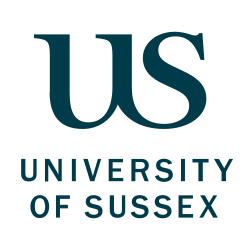The University of Sussex

University of Sussex Coat of Arms
|
|
| Motto | Latin: Vacate et scire |
|---|---|
|
Motto in English
|
Be still and know |
| Type | Public |
| Established | 1961 (Royal Charter) |
| Endowment | £9.4 million (2015) |
| Chancellor | Sanjeev Bhaskar |
| Vice-Chancellor | Adam Tickell |
| Visitor | The Lord President of the Council ex officio |
|
Academic staff
|
1075 |
|
Administrative staff
|
1207 |
| Students | 15,155 (2015/16) |
| Undergraduates | 10,940 (2015/16) |
| Postgraduates | 4,215 (2015/16) |
| Location | Falmer, East Sussex, England |
| Campus | City, Campus, Seaside |
| Colours | White and Flint |
| Affiliations | Universities UK, BUCS, 1994 Group |
| Sports | Rugby, Football, Hockey, Lacrosse, Volleyball |
| Mascot | Badger |
| Website | www.sussex.ac.uk |
|
ARWU (2017, national) |
21-28 | |
|---|---|---|
|
ARWU (2017, world) |
201-300 | |
|
QS (2018, national) |
30 | |
|
QS (2018, world) |
228 | |
|
THE (2018, national) |
21= | |
|
THE (2018, world) |
147= | |
|
CWTS Leiden (2017, world) |
205 | |
|
Complete (2018, national) |
19 | |
|
The Guardian (2018, national) |
20 | |
|
Times/Sunday Times (2018, national) |
27 | |
| Teaching Excellence Framework | Silver | |
The University of Sussex is a public research university in Falmer, near Brighton in Sussex. The university received its Royal Charter in August 1961, and was a founding member of the 1994 Group of research-intensive universities promoting excellence in research and teaching.
Sussex counts three Nobel Prize winners, 14 Fellows of the Royal Society, six Fellows of the British Academy and a winner of the Crafoord Prize among its faculty. In the latest rankings, the university was placed 62nd in Europe and 140th in the world by the Times Higher Education World University Rankings 2015–16. The Guardian University Guide 2016 placed Sussex 19th in the United Kingdom and the Times and Sunday Times Good University Guide 2016 also ranks Sussex 19th. The 2015 Academic Ranking of World Universities placed the university within the top 18-21 in the United Kingdom and in the top 151-200 internationally.
In an effort to establish a university to serve Brighton, a public meeting was held in December 1911 at the Royal Pavilion in order to discover ways to fund the construction of a university; the project was halted by World War I, and the money raised was used instead for books for the Municipal Technical College.
The idea was revived in the 1950s and, in June 1958, the government approved the corporation's scheme for a university at Brighton, to be the first of a new generation of what came to be known as plate glass universities. The University was established as a company in 1959, with a Royal Charter being granted on 16 August 1961. The University's organisation broke new ground in seeing the campus divided into Schools of Study, with students able to benefit from a multidisciplinary teaching environment. Sussex would emphasise cross-disciplinary activity, so that students would emerge from the university with a range of background or 'contextual' knowledge to complement their specialist 'core' skills in a particular subject area.
...
Wikipedia

